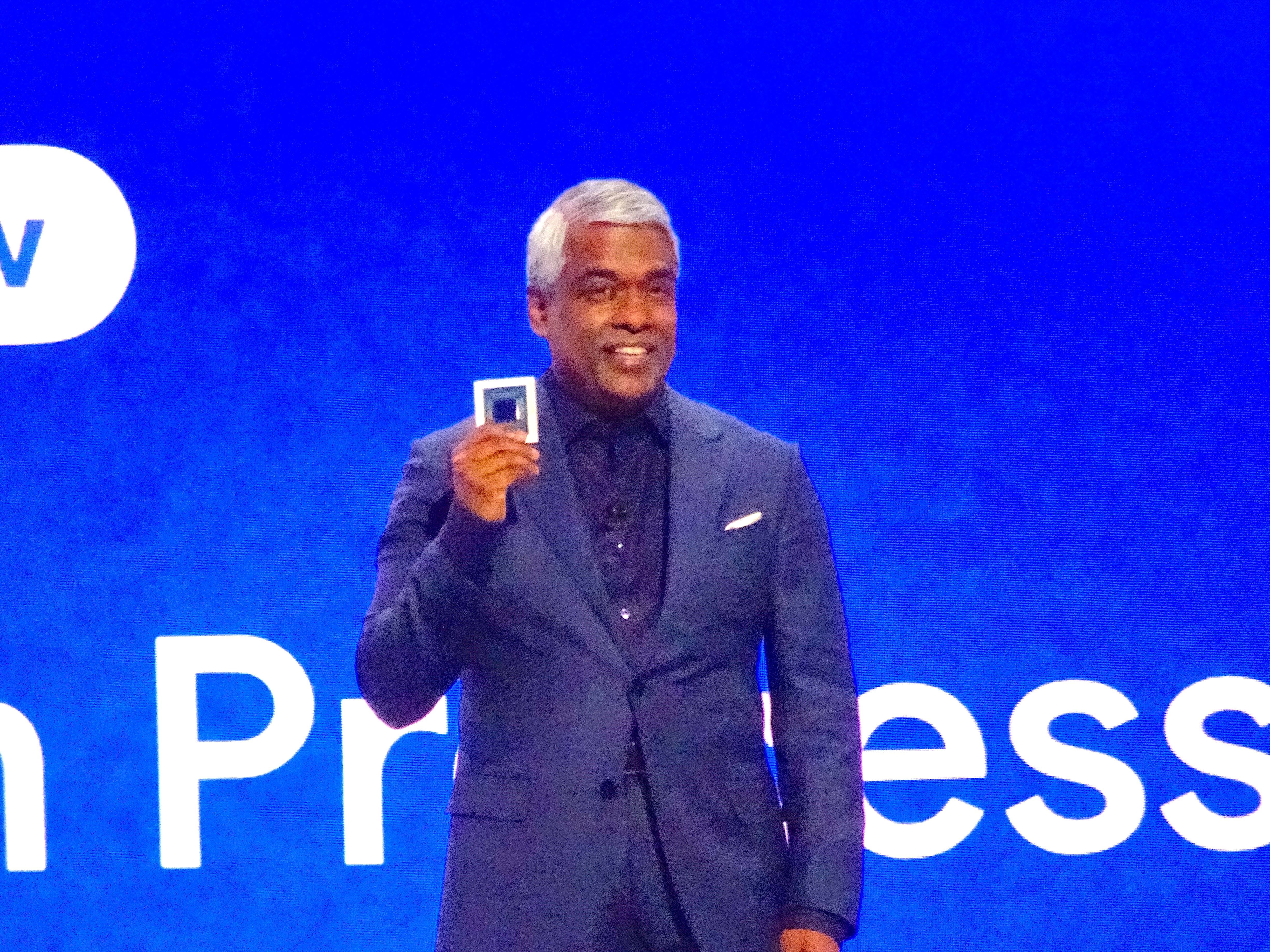 CLOUD
CLOUD
 CLOUD
CLOUD
 CLOUD
CLOUD
Google LLC’s cloud unit today detailed Axion, an internally developed central processing unit based on a core design from Arm Holdings plc.
The CPU made its debut at the company’s Cloud Next conference in Las Vegas during the keynote by Google Cloud Chief Executive Thomas Kurian (pictured). The event also saw the cloud unit announce the general availability of the TPU v5p, its latest artificial intelligence accelerator. The latter chip can provide twice the performance of its predecessor when processing floating point numbers, data units commonly used by AI models.
“Amdahl’s Law suggests that as accelerators continue to improve, general purpose compute will dominate the cost and limit the capability of our infrastructure unless we make commensurate investments to keep up,” Amin Vahdat, vice president of Google Cloud’s machine learning, systems and cloud AI team, wrote in a blog post.
Google Cloud hasn’t yet shared a detailed overview of Axion’s architecture, such as how many cores it includes and the amount of onboard cache. The company told TechCrunch that more information about the chip’s design will be made available later this year. However, Google Cloud did divulge today that Axion is based on Arm’s Neoverse V2 CPU core design.
Introduced in 2022, Neoverse V2 is optimized for cloud data centers and other high-performance computing environments. It’s twice as fast as Arm’s previous-generation core design. According to the chipmaker, this speedup is partly the result of optimizations that allow the Neoverse V2 to more quickly process integers, common units of data used in many types of computations.
Processors based on the Neoverse V2 may be equipped with up to 256 cores and 512 megabytes of cache. They can also use ARMv9, Arm’s latest instruction set architecture. A chip’s instruction set architecture comprises the machine language in which it expresses computations and certain related technologies.
One of the ARMv9 features Neoverse V2 supports is a cybersecurity mechanism called the Memory Tagging Extension. According to Arm, it spits the memory attached to a chip into 16-bit segments and adds four additional bits to each segment that act as a kind of lock. Only applications with permission to access a memory segment can get past the lock, which reduces the risk of hacking.
Neoverse also supports ARMv9’s PDP, or performance-defined power, feature. This capability makes it possible to increase a CPU’s power efficiency by reducing its maximum performance.
In Google Cloud’s data centers, Axion processors will be deployed alongside an infrastructure optimization system called Titanium. It offloads some tasks from Axion processors to leave more of their compute capacity available for customer workloads. According to the search giant, Titanium comprises three sets of internally developed chips.
The system uses a microcontroller, or simple processor, called Titan as a root of trust for Axion. A root of trust is a hardware module that prevents hackers from introducing malicious code into a server when it boots. According to Google Cloud, Titan also helps secure network traffic in its data centers.
Axion relegates some of the computations involved in processing users’ network traffic to another custom chip, dubbed TOP, that is also part of the Titanium system. Meanwhile, a third custom processor called the Titanium adaptor helps run the virtualization software that powers Google Cloud instances. Hyperdisk, Google Cloud’s block storage service, also takes on some of the computing tasks that would otherwise be performed by Axion to further boost performance.
“Axion processors deliver giant leaps in performance for general-purpose workloads like web and app servers, containerized microservices, open-source databases, in-memory caches, data analytics engines, media processing, CPU-based AI training and inferencing, and more,” Vahdat detailed.
Google Cloud says instances powered by Axion can provide 30% better performance than the fastest general-purpose Arm-based instances offered by rivals. Additionally, the search giant is promising up to 50% higher processing speeds and 60% better power efficiency than instances based on Intel Corp. silicon. Google Cloud plans to make Axion available to customers later this year.
The search giant will also use the chip to power several of its internal workloads. Google has started retooling its data centers to run certain Google Cloud services, YouTube’s advertising system and the Google Earth Engine satellite image analysis platform on Arm-based hardware. It plans to deploy some of those workloads on Axion-powered servers in the near future.
Support our mission to keep content open and free by engaging with theCUBE community. Join theCUBE’s Alumni Trust Network, where technology leaders connect, share intelligence and create opportunities.
Founded by tech visionaries John Furrier and Dave Vellante, SiliconANGLE Media has built a dynamic ecosystem of industry-leading digital media brands that reach 15+ million elite tech professionals. Our new proprietary theCUBE AI Video Cloud is breaking ground in audience interaction, leveraging theCUBEai.com neural network to help technology companies make data-driven decisions and stay at the forefront of industry conversations.